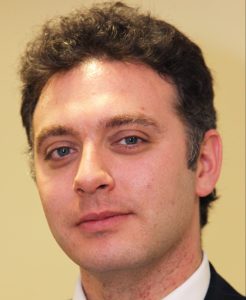
“People are not things,” is a memorable mantra, sometimes attributed to the late Lord David “Rambo” Ramsbotham (1932-2022), a former British army general and outspoken chief inspector of prisons.1 The aphorism is highly appropriate to this month’s Life and Times, set amid strikes of nurses and paramedics, with the potential of more doctors’ strikes to come. Given some of the recent public rhetoric about GPs, I wonder if we are perceived as are ‘things,’ to be manufactured or bought-in and deployed where needed as a means to cheap healthcare, without considering that we are also people with personal lives, families and citizenship or even basic human rights. In this issue David Zigmond argues that mass-produced doctors risk becoming commodified, with work stripped of human connection and meaning.2 These are essential to a flourishing practice in a literal sense. Without meaning and connection, work is robotic, even hollow.
Are GPs ‘Econs’?
If we are not ‘things,’ GPs might be portrayed as examples of homo economicus, sometimes called ‘Econs,’ the rational self-interested person that classical economic theory assumes we all are.3 Econs naturally aim to minimise work and maximise gain and one can see how this might play into the false narrative of work-shy GPs avoiding face to face consultations.
Without meaning and connection, work is robotic, even hollow.
Cambridge professor Martin Roland has playfully demonstrated the dangers of adopting purely economic values and purely financial incentives: GPs with lists might do as little as possible for as many people as possible, fee for service GPs might maximise profit by doing unnecessary or unduly expensive work, and those incentivised by evidence-based targets might do this to the exclusion of all else.4 As many recent economists have accepted, however, people are generally not ‘Econs.’3 I would argue GPs still have a sense of idealism that renders them susceptible to moral exploitation.
On rational self-interest
Nada Khan discusses the unlimited nature of general practice workload, calling for safe limits. This is not a call to be work-shy: the uncapped nature of general practice work is unsafe for doctors and patients alike even on a day-to-day basis.5
This is not a call to be work-shy: the uncapped nature of general practice work is unsafe for doctors and patients alike even on a day-to-day basis.
Medical indemnity bodies are keen to remind us that we are more prone to harmful medical errors when hungry, angry, running late, and tired (HALT).6 The uncapped nature of general practice also has a systemic effect on the health service. Burnt out or ‘morally-injured’ doctors are retiring, changing careers, moving to other countries, or worse, with recent reports of GPs taking their own lives.5 This results in fewer doctors covering more work, and the daily grind becomes yet worse. Richard Armitage explores what junior doctors’ leaving the NHS, whether for alternative careers or alternative employers, would mean downstream for general practice. He advises policymakers that the willingness of junior doctors to go on strike or leave is a signal that things need to urgently improve.7
Ayu Takayanagi explores two ways in which a society founded on self-interest might consider those who are most in need of healthcare, a problem which Julian Tudor Hart framed as the inverse care law (Those most in need are least likely to be able to access healthcare). For the philosopher Rawls, enlighten self interest means we should look after those who are lest fortunate, because they could be us, or those whose we love. According to ‘free-market’ philosopher Nosick, healthcare should be a private choice and no one should be taxed for it. Takayangi notes that health insurance favours the healthy and wealthy, and that lack of infrastructure and the challenging nature of work in under-served areas is a disincentive to work in those areas.8
Identity, patient-unmet-needs and doctor-educational-needs
The interdependence of doctors and patients is manifest when considering medical education. Among a variety of useful ideas, Ahmed Rashid alights on the complex process by which medical students learn to think, feel, and act like physicians — known as professional identity formation (PIF). This has become an important focus of medical education. Arts-based courses, which might be otherwise be seen as ‘leisure’ can enrich medical learners’ reflections and provide a space for them to be vulnerable.9
If arts-based medical education is perceived as a luxury in these time-pressured days, then what hope is there for reflection? Two thoughtful pieces in this issue may help us to stop and think about the philosophy and psychology of general practice. Anna Pacholczyk and colleagues invite us to consider the role of luck in our practice. Many of our actions can have uncertain outcomes, some of them bad for others or for us, and moral courage may be required to do the right thing.11 Ben Hoban suggests that GPs can keep track of more in the consultation by not worrying about keeping track of so much, but instead choosing what to focus on in an agile dance of professional interaction with patient need.12
Not ‘Things,’ Not ‘Econs’
When policymakers talk about under-doctored areas, or a lack of appointments, I get the sense that GPs are like chess pieces on a board. If contemplating stopping work whilst there is still work to be done, there is a sense of dereliction of duty to the public without recognition that the GPs are members of that public themselves. When GPs and other healthcare professions are recognised as citizens or people, it seems to be as ‘Econs,’ to be labelled as lazy or offered extra money to work in a way that no longer has meaning. We are not ‘Things,’ but I don’t think we are ‘Econs’ either…
References
- Weinberg C, David Ramsbotham: a tribute. https://www.crimeandjustice.org.uk/resources/david-ramsbotham-tribute (accessed 10 Feb 2023).
- Zigmond D. Manufacturing doctors is one thing; working communities is quite another. Br J Gen Pract 2023; DOI: https://doi.org/10.3399/bjgp23X732177.
- Thaler, Richard H. Misbehaving: The Making of Behavioral Economics. Norton WW, 2017.
- Papanikitas A. Accounting for ethics: is there a market for morals in healthcare? In: Feiler T, Hordern J, Papanikitas A, editors. Marketisation ethics and healthcare. London: Routledge, 2018.
- Khan N. Put a cap on it: safe workload levels in general practice. Br J Gen Pract 2023; DOI: https://doi.org/10.3399/bjgp23X732153.
- Papanikitas A. Self-awareness and professionalism. InnovAiT 2017;10(8):452-457.
- Armitage R. Junior doctors leaving the NHS: what would it mean for general practice? Br J Gen Pract 2023; DOI: https://doi.org/10.3399/bjgp23X732189.
- Pacholczyk A, Hooper C, Spicer J. Be lucky. Br J Gen Pract 2023; DOI: https://doi.org/10.3399/bjgp23X732201
- Rashid A. Yonder: HFpEF amputees, professional identity formation, and leadership training. Br J Gen Pract 2023; DOI: https://doi.org/10.3399/bjgp23X732225.
- Takayanagi A. Rational self-interest and the inverse care law: how Rawls and Nozick might have reflected on Julian Tudor Hart’s problem. Br J Gen Pract 2023; DOI: https://doi.org/10.3399/bjgp23X732213.
- Hoban B. Flag-waving and learning to dance. Br J Gen Pract 2023; DOI: https://doi.org/10.3399/bjgp23X732237.








